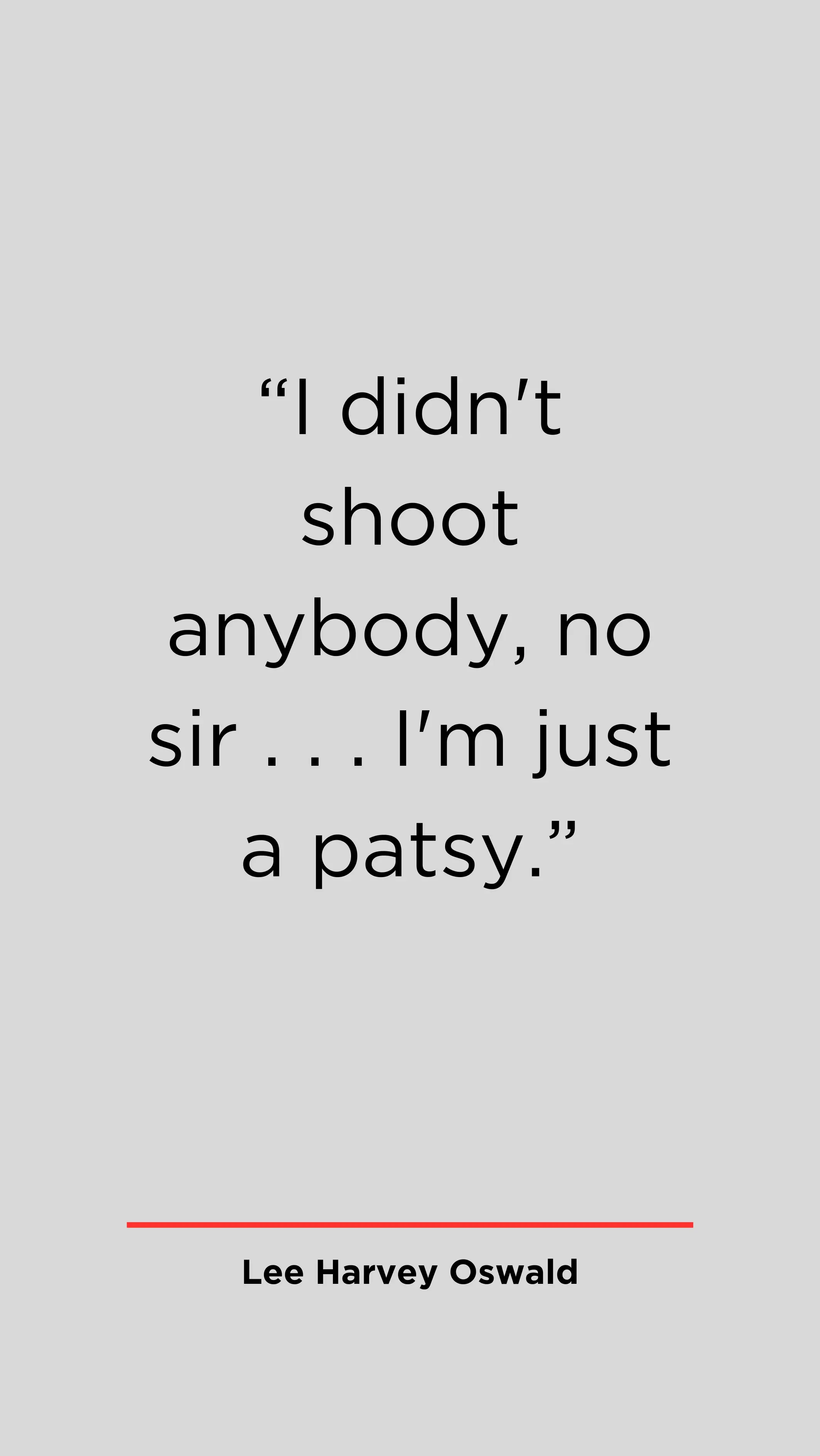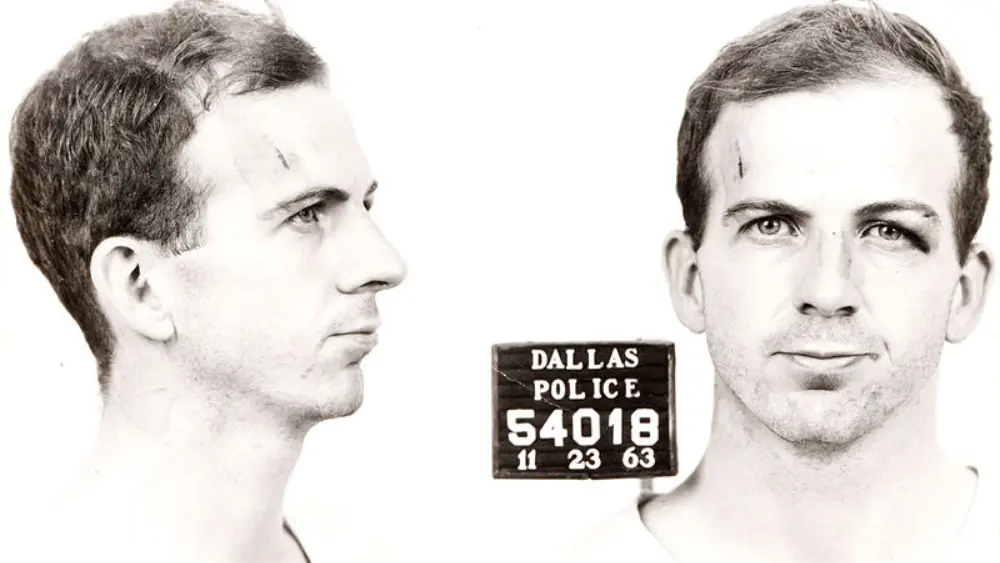Lee Harvey Oswald, born on October 18, 1939, in New Orleans, Louisiana, is forever etched in history as the man accused of assassinating President John F. Kennedy. The events surrounding Kennedy’s death on November 22, 1963, in Dallas, Texas, have sparked numerous theories and debates, making Oswald a central figure in historical discussions.
Early Life and Military Service
Lee Harvey Oswald’s early life was characterized by upheaval and instability. Born in 1939, he faced frequent relocations and familial challenges, which contributed to a sense of rootlessness. Seeking a sense of direction, Oswald made a significant decision in 1956 by enlisting in the United States Marine Corps. While his military service was unremarkable, serving as a radar operator, it offered a glimpse into his character and the potential motivations that would later become a subject of intense scrutiny.
Oswald’s time in the Marines hinted at a complex individual, and his subsequent journey, including his defection to the Soviet Union and later return to the United States, set the stage for the events that would unfold in the years to come. His military service, though seemingly ordinary, became a part of the larger narrative that surrounded his enigmatic life and contributed to the myriad theories and speculations regarding his actions and motivations.
Lee Harvey Oswald: Radar Operation and Defection to the Soviet Union
Lee Harvey Oswald’s military career took an unexpected turn when he trained as a radar operator during his service in the United States Marine Corps. His skills led to a brief assignment at the U-2 spy plane base in Atsugi, Japan, where the military’s high-altitude reconnaissance aircraft were stationed. Oswald’s dissatisfaction with military life and, possibly, broader ideological considerations prompted a surprising move—he defected to the Soviet Union in 1959. This decision marked a critical juncture in his life and set in motion a series of events that would later make him a central figure in one of the most significant moments in American history.
Oswald’s defection to the Soviet Union introduced a layer of complexity to his narrative, sparking questions about his motives and allegiances. The act of renouncing his U.S. citizenship and seeking asylum in a Cold War adversary added intrigue to his already mysterious persona. This episode in Oswald’s life would become a focal point in the investigations and debates surrounding the assassination of President John F. Kennedy, contributing to the enigma that continues to surround his legacy.
Return to the United States and Civilian Life
Upon returning to the United States in 1962, Lee Harvey Oswald found himself in a state of personal and professional instability. Despite his military background, Oswald struggled to secure stable employment. During this period, he became increasingly entangled in political activities, aligning himself with both pro-Castro and anti-Castro groups. This complex ideological stance added layers of ambiguity to Oswald’s motives and beliefs, making it challenging for investigators and historians to untangle the web of influences that shaped his actions.
Oswald’s involvement in political activities and associations with divergent ideological factions would become a focal point in understanding his motivations for the assassination of President John F. Kennedy. His actions, both before and after his return to the U.S., further contribute to the complex narrative surrounding Oswald, creating a puzzle that continues to captivate the public’s imagination and fuel various conspiracy theories surrounding one of the most significant events in American history.
Lee Harvey Oswald: Discharge and Transition to Civilian Life
Lee Harvey Oswald’s military service came to an early and somewhat tumultuous end with his discharge in 1959. Oswald’s dissatisfaction with military life played a role in this decision, setting the stage for his subsequent actions. His discharge marked the beginning of a challenging transition to civilian life, during which Oswald grappled with personal discontent and a growing disillusionment with American society.
The period following Oswald’s discharge became a critical juncture in his life, as he embarked on a journey that would lead him to defect to the Soviet Union. This decision not only reflected his dissatisfaction with his military experience but also signaled a broader discontent with the societal and political landscape of the United States. Oswald’s complex motivations during this transition period would later become central to investigations into his role in the assassination of President John F. Kennedy, adding layers of complexity to the narrative surrounding one of the most consequential events in American history.
The Kennedy Assassination and Arrest
Lee Harvey Oswald became forever entwined with one of the most significant events in American history, the assassination of President John F. Kennedy on November 22, 1963. Oswald was arrested shortly after the shooting, and the evidence against him seemed to point unmistakably to his involvement in the assassination. Despite the mounting weight of this evidence, Oswald vehemently maintained his innocence. His arrest and subsequent denials set the stage for one of the most scrutinized criminal investigations in U.S. history.
The shocking turn of events took an even more dramatic twist when Oswald, in police custody, was murdered by Jack Ruby on live television two days after the assassination. This unexpected act intensified suspicions and fueled conspiracy theories surrounding Kennedy’s death. The abrupt end to Oswald’s life left many questions unanswered and contributed to the enduring controversy and mystery surrounding the circumstances of President Kennedy’s assassination.
Lee Harvey Oswald: Questions of Motivation
Lee Harvey Oswald’s military background and the circumstances surrounding his discharge have been subjects of intense scrutiny and speculation in the context of the Kennedy assassination. Some theorists delve into Oswald’s military service, particularly his training as a radar operator and his brief assignment at the U-2 spy plane base in Atsugi, Japan. These aspects of his military experience have led to conjectures about potential connections to intelligence agencies and covert operations.
Theories regarding Oswald’s motivations for assassinating President Kennedy often intertwine with suspicions surrounding his military history. Some suggest that his dissatisfaction with military life, along with a perceived ideological shift during his time in the Soviet Union, may have influenced his decision to target the president. The questions surrounding Oswald’s military background add layers of complexity to the overall narrative of the Kennedy assassination, prompting ongoing discussions and investigations into the factors that might have driven his actions.

Legacy and Ongoing Controversy
The enduring controversy surrounding the assassination of President John F. Kennedy deeply entwines the legacy of Lee Harvey Oswald. Decades after the tragic event in 1963, questions persist about Oswald’s motives, the possibility of accomplices, and the circumstances leading up to that fateful day in Dallas. The lack of definitive answers has fueled ongoing speculation, conspiracy theories, and debates among historians, researchers, and the general public.
The Kennedy assassination remains a subject of intense interest, with numerous investigations, documentaries, and publications seeking to shed light on the complex web of factors surrounding Oswald and the events of November 22, 1963. The enduring controversy and the multitude of unanswered questions contribute to the mystique and historical significance of Lee Harvey Oswald, ensuring that his role in one of the most pivotal moments in American history remains a topic of fascination and scrutiny.




